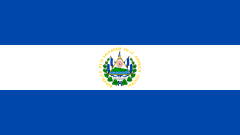
source: AFP
San Salvador (AFP) – A new law allowing as many as 900 alleged gang members to be tried at a time in El Salvador, where tens of thousands have been arrested in a crackdown, has alarmed justice experts and rights groups who fear it is a reelection ploy by President Nayib Bukele.
Almost 72,000 people accused of belonging to criminal gangs are imprisoned in El Salvador under a state of emergency that allows arrests without a warrant in what rights groups have described as "arbitrary detention."
Bukele has also built a mega prison -- which he says is the largest in the Americas -- to lock up 40,000 suspected gangsters in harsh conditions also decried by human rights organizations.
Now, collective trials will further violate "the rights to an adequate defense, to a fair trial and the presumption of innocence," Amnesty International Americas director Erika Guevara Rosas told AFP.
The measure was approved by a Bukele-friendly Congress Wednesday under the state of emergency in place since March 2022, which critics say has seen innocent people caught in the dragnet.
"We have seen how the legal reforms associated with this repressive measure (the state of emergency) have sought to erode the basic guarantees of the criminal process," said Guevara Rosas.
'Unconstitutional'
Antonio Duran, a judge in the city of Zacatecoluca who is critical of the state of emergency, said the main goal of the mass trials -- for which no starting date has been set -- appeared to be "heavy and rapid sentences."
"Mass trials contradict... the (legal) principle of individual responsibility," he told AFP, adding the measure flouted "international standards" of justice.
"This is all part of Bukele's campaign for reelection, which is unconstitutional," the judge said.
Bukele, with a controversial green light from the Constitutional Court, has announced he will run in elections next year despite a constitutional ban on successive presidential terms.
The president, 42, is basking in massive public support due to his "war" on gangs, which has vastly improved security for ordinary citizens of the Central American country.
"The most important thing is the benefit to the population and that is why the measures are taken and why the people support them," sociologist Rene Martinez from the University of El Salvador told AFP.
- 'Killing the rule of law'-
However, the Center for Justice and International Law (CEJIL), an NGO for human rights in the Americas, said collective trials would make it "impossible" to guarantee "a fair trial and the right to a defense."
"This makes us wonder if the government's policy of persecuting the gangs, organized crime, is killing the rule of law and democracy," Marcela Martino, CEJIL deputy director for Central America and Mexico, told AFP.
Miguel Montenegro, executive director of the non-governmental Human Rights Commission of El Salvador, pointed to political expediency for the mass trial move.
It was, he said, "aimed at convincing those who are doubting the government."
The measure also allows for suspects to be held for up to 24 months before being brought to trial or released.
It would mean that innocent people will inevitably end up being tried, and convicted, along with real gangsters, said Samuel Ramirez of the MOVIR movement for victims of rights abuses in El Salvador.
Polls show that nine out of ten Salvadorans support Bukele, but there is no consensus on mass trials.
Factory worker Virgilio Gutierrez told AFP in San Salvador he thought the move was a "good" one as individual trials would "take a long time... If they take them case by case they will never finish."
But lottery ticket salesman Juan Mejia was against mass trials as "the law says they must be individualized, one by one."
